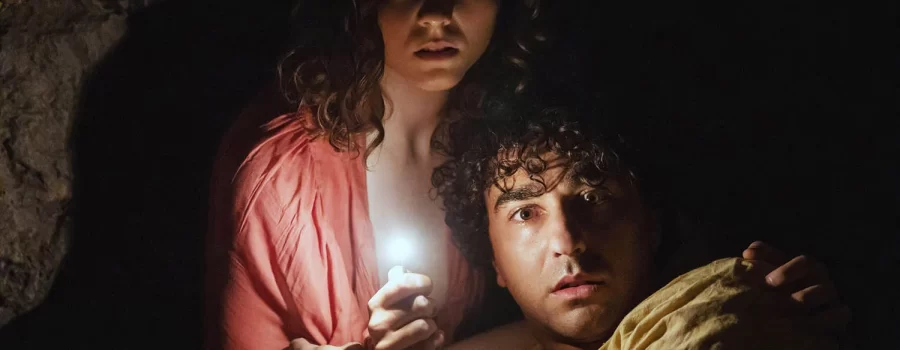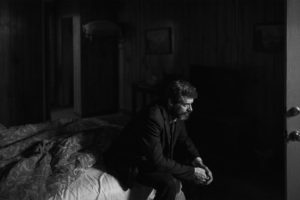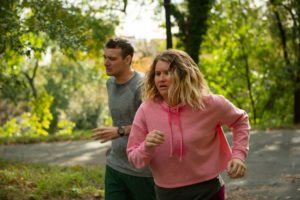[Published at Slant Magazine] Son of actor Polly Draper and jazz pianist Michael Wolff, Alex Wolff got his first break alongside his older brother, Nat Wolff, on the Nickelodeon musical comedy series The Naked Brothers Band. Since then, the multi-hyphenated Wolff has composed the score for two films and contributed to the soundtrack of nine. That’s on top of his prolific work as an actor, and considering that he moves as effortlessly through a scene as Oscar Peterson solos through “Cottontail,” it’s only apt that he’s prone to describing his acting in musical terms.
Wolff’s naturalistic style shines through in both Michael Sarnoski’s Pig and M. Night Shyamalan’s Old. In the former, he and Nicolas Cage work in harmony to maximize the emotion in Vanessa Block and Sarnoski’s story about a despondent man in search of his stolen pig. And in the latter, a genre-meshing adaptation of the graphic novel Sandcastle that represents a further departure from Shyamalan’s traditional horror sensibilities, Wolff imbues his character with a free-flowing range of searingly authentic emotional chords.
Prior to the release of Old, I had the opportunity to speak with Wolff about collaborating with a filmmaker as precise as Shyamalan and how that differed from his work on Pig, as well as the exhilaration and “other-dimensionality” of working with Cage, which he likens to “jazz.”
Pig is immensely thoughtful, delicate, and emotionally rich. For you, what separated the script from others that you’ve read?
I feel like that’s the truth—that it’s just better. It’s just an original, beautiful, funny, fascinating script that has so much love in it. It was radiating off the page to me.
There’s something to say about constantly subverting audiences’ expectations. It never goes to the illogical extreme that some audiences may even hope for.
For me, it was exactly what I could have dreamed of. I felt like every turn it took was exactly what I wanted. I wouldn’t say that I ever wanted it to go somewhere, just that maybe I’m emotionally programmed to expect it to go somewhere because I’ve had these unsavory revenge movies pile-driven into my system. Rather than just diverting our expectations for expectations’ sake, it’s focusing in on where we really hope it will go, in a more deep, philosophical direction. It’s more akin to Midnight Cowboy and Rain Man than it is to something like John Wick or any other type of revenge story. It’s a real love story.
In a lot of ways, with its themes of overconsumption, tragedy of the commons, and isolationism, this film defines a forlorn generation. What’s your character’s purpose on this odyssey, and how is he changed by it?
The movie is about two people connecting and needing each other. Every other element of it is just delicious, entertaining stumbles along the way. But what’s happening at the core is that these two unlikely, adversarial guys are slowly drifting toward each other and realizing they need each other. And they’re both really lonely and heartbroken. And so that’s about as universal and titillating accomplishment I’ve ever seen in the past 20 years.
Nicolas Cage stated in an interview with director Brian Taylor that he channels rather than acts, because acting implies lying. And Pig feels as authentic as a film I’ve seen in a long time. What was it like working with a man so committed to his craft?
I’d agree with him that he just channels. The tricky thing is trying to intellectualize it later. It’s tough. I don’t think he says that in the interview because that is the best way of describing it. But I believe it goes deeper than channeling. What Nick does is other-dimensional. It’s something ineffable. It’s something you can’t palpably describe. It’s such a true, extreme form of human expression and such a focused way of emotionally communicating, that it was a mystery until the very last moment we were acting together how he could pull these things out like a magician. It was fucking exhilarating being next to.https://www.youtube.com/embed/9uOCuPNkZ84
He also said in the same interview that there’s no traditional “over the top” with him because he defines that top and that line. Did he do that with everyone involved in Pig?
Yes. But that’s him trying to answer for something that’s larger. It comes through him and he feels it. I don’t think he’s trying to elevate anything. He accidentally elevates everyone around him. But his craft is so beyond words. That’s why we do it, although neither of us can intellectually hold it in our hand what makes acting together so special. What we had was just a connection that was really about the two of us dancing together. It was jazz.
That’s a great way to describe it. The pig is more a catalyst to really serve as a connection between Robin and Amir.
It’s a love story between them. That’s really what it is. We also thought it was like Midnight Cowboy meets The Odd Couple. The pig, while it’s unbelievably important to him, and really, he loves her and that’s the main reason he wants to search for her, in some ways, the pig serves as a surrogate for a need for friendship and a need for human love and companionship.
The connection he has with the pig resonates with me. My dog is my best friend.
Same.
Our society often places the importance of love between humans and animals lower than that between humans. Do you agree that they’re actually on an equal level?
Oh, absolutely it’s on an equal level. A relationship between a human and an animal, if it’s deep enough, can be the most enriching, rewarding experience that there ever could be. I love my dogs more than 98% of people, maybe 100%.
This marks an impressive feature debut for Michael Sarnoski.
I mean, unbelievable.
How did his style dictate how the story was visualized?
Well, the great thing about Michael was that he never imposed a style. He just put the camera where he wanted and let us do our thing and never tried to impose his will or try to control anything. And he let us improvise when it suited the story. And I felt like the more hands-off he was, the more fresh the performances were, and the more clearly his vision ran through the story. So, in that way, I felt like I was really blessed to work with a guy who was confident enough to let the actors bring their own kind of emotional gravitas to the project.
Speaking of improvisation, was the kicking-the-car scene improvised?
No. The dialogue is almost all the script, and I feel like it really is a credit to this unbelievable dialogue in the script. His style of dialogue is as if he’s just listening in to a conversation between these two people. But with that, it’s more the direction you want to let the scene go, the direction of the actors and letting them bleed through. And that was the scene where I felt we both individually brought a lot of pain and emotion into it. And he really let that explode.
Your other new movie is Old. M. Night Shyamalan has such a respect for the art of screenwriting and filmmaking. How would you describe his approach on set?
Very different from Michael’s, but in an equally exhilarating way. He’s very, very hands-on and wants things to be very precise. And I found that that was liberating in its own way. I liked knowing exactly what song I was playing and exactly what kind of dance we were doing. And it was very enjoyable for me to go to these exact places and these exact beats and have everything be so in-sight and precise and telegraphed in a beautiful way. But then he emotionally gave a lot of freedom so things could pour out of us and could arrive again on the day that was, maybe more special or unprecedented or unplanned. That would be totally accepted, and he’d be very excited about it. The consistent thing that Night always wanted was the stakes to be extremely high, and he wanted to feel like you were really pushing yourself to the point of discomfort, to the point of feeling like, “I’ve never done this before. I’m scared.” He really wanted people to get there because some really unique responses come out of that. Some unique performances. And that’s why his films are, all from the very beginning, totally unique and totally raw, and the performances are all always just stunning.
And had you read Sandcastle before?
I read Sandcastle after I auditioned, and when I did I knew I really wanted to be in the movie. I was like, “Oh, shit. If I don’t get this, I’m going to be really sad.” And then it just so happened that that worked out and he responded to my tape. And then we had a really terrific meeting together. And I just read for him and I felt like we had an immediate connection.
Did you notice key elements in Shyamalan’s adaptation that were, for lack of a better term, Shyamalanian?
I am keeping very conservative in what I’m saying. I’m going to be very conservative.
Was he generally faithful to Sandcastle?
Good luck getting it out of me, bro. Good luck. I’ve been doing this all week. You can try.
How about this one: How does the mystery of the cave challenge or propel forward the characters’ arcs?
I’m telling you, bro, I’m not going to say anything about it.
This one should work. If Old is an allegory for anything, what would you describe it as?
Oh, that’s great. The whole movie is allegorical for a lot of things. Everybody who sees it should have a whole different—not interpretation necessarily, but it’s going to be very thought-provoking. The movie is metaphorical and allegorical for a million different things, where it would almost do it a disservice by trying to assign it to one sort of metaphor or one thing that’s applicable, philosophically. Because I feel that it’s about marriage, in some ways, and what it takes to forgive each other. It’s about family—how to bring an entire family together. It’s about aging. Have you spent your time properly? Have you wasted time? It’s about anger and what that means over a period of time. The movie is really a deep philosophical experiment that, way more than answering questions, asks a lot of questions of the audience, which are my favorite type of films. I always have said it’s on par with Persona or The Exterminating Angel and these films that are asking larger questions about, especially, a cluster of people and what they represent in each other and what they represent in the scheme of the world. People are going to be really surprised by how existential this movie is.
Since appearing in Ari Aster’s Hereditary, you seem increasingly drawn to horror films. What about this genre intrigues you as an actor?
Well, I would put Hereditary and Old in different countries. Hereditary’s goal is to shatter your sense of safety and comfort, and it does that by being so elegant in the storytelling before the horror kicks in. By contrast, Old is really a fairy tale. It’s more on par with experimental movies like The Lighthouse or these other films that we’ve been talking about. It’s on par with Kuroneko. I like to joke that it’s a Bergman blockbuster. It could both be in Shyamalan’s wheelhouse of Split or The Visit, but also could be on par with a late ‘50s Swedish movie. It’s just so odd and takes so many risks. It’s so defiantly not a horror movie, and so, I think, people are going to be disappointed if they go in expecting that. They’re going to be really excited if they go and try not to put it in any box, not try to put it in any category.
What project, or projects, on your upcoming slate has you the most excited?
I feel like I get the most excited about other people’s projects. I’m really excited about a couple of movies that Nic has coming out. I’m also really excited to see Sean Baker’s Red Rocket. A lot of movies at Cannes this year I’m excited to see. I’m doing a few movies the next couple months that I’m excited about, and I’m directing a movie in the spring of 2022. So that’ll be really exciting for me as well. And also, I would love for people to see The Cat and the Moon, my first film that I directed. I feel like I’m still very, very excited by that.
Can you give any information on your upcoming directorial project?
Yeah. It’s starring a great, amazing actress. It’s probably going to be announced very soon. I’m trying not to disclose the news yet, but I’m really excited about it and feel like it’s going to be experimental in its own right. I’m trying not to get too excited about anything I do because what I try to do is get exhilarated about the part and exhilarated about the role and think about the experience, but try not to think about the final product. It’s hard to just think about what’s next when you’re so in the midst of creatively making something. It’s hard to think about if it’s going to be good or something like that. That’s a job for you guys.






![Kieran Culkin Talks HBO’s ‘Succession’ And The Therapeutic Benefits Of Playing Sociopaths [Interview]](https://www.makingacinephile.com/wp-content/uploads/2018/07/Kieran-Culkin-Succession-HBO-1200x520-300x200.jpg)

Leave a Reply
Your email is safe with us.